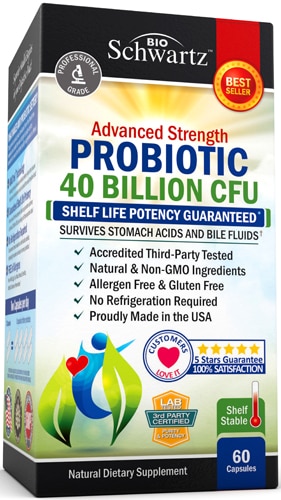[vc_row][vc_column][vc_column_text]To have the benefits demonstrated in clinical studies,
probiotics need to contain sufficient amounts of live organisms when you take them—whether that's the day you buy them or the day the bottle says they expire.
Does that mean you need to choose refrigerated probiotics? Or are shelf-stable probiotic supplements just as effective?
The answer lies in the manufacturing process and the sensitivity of different probiotic strains.

How are probiotics made?
Manufacturers of probiotics aim for high yields of stable cells to create supplements that contain the amounts of microorganisms shown to be effective in clinical studies. But the conditions in large-scale manufacturing are much different than in a lab. The process must be scaled up with careful testing and consistent quality control for enough probiotic microbes to survive.
Growing probiotics for supplements starts with three steps:
- A small amount of a contaminant-free probiotic strain is fermented until it reaches the volume required for large-scale fermentation.
- The microbes are added to a nutrient-rich culture medium in a fermentation vessel.
- When the main fermentation is done, the mixture is spun in a centrifuge to separate the microbes from the medium.
Why don't probiotics die when they're processed?
Before further processing, probiotic microbes must be protected with stabilizers to keep them alive. These protective substances, known as lyoprotectants and cryoprotectants, shield cell membranes from damage during the next step: freeze drying.
To prepare probiotics for use in supplements, the microbes are frozen quickly at very low temperatures. A low-temperature, low-pressure evaporation process removes water and puts the microbes in a dormant state. The freeze-dried microbes are then milled into a powder that may be mixed with other strains or ingredients.
Proper monitoring and control during every stage of manufacturing limits cell damage during processing to maintain the highest possible level of live probiotics in finished products.
What's the difference between shelf-stable and refrigerated probiotics?
Freeze-dried probiotics stay stable at typical indoor temperatures after processing, so they can be stored without refrigeration.
But some probiotic strains are too
sensitive to temperature changes and environmental conditions to survive freeze-drying. That's why some probiotic supplements hang out happily on store shelves while others chill out in a cooler nearby.
How do probiotics stay alive in supplements?
Whether refrigerated or freeze-dried, microbes in probiotic supplements don't grow or multiply until they reach your gut, where they encounter the temperature, acidity, water, and nutrients they need to become active again.
But before they get to your gut, dormant microbes can be affected by transportation and storage conditions. Refrigerated probiotics that get too warm during shipping may die off, and shelf-stable probiotics can become less effective when exposed to heat or humidity. Manufacturers may add extra probiotic organisms, known as "overage," to their products to compensate for potential decreases in viability.
While these practices can help probiotics stay alive in supplements, the
microbes don't always survive the high acidity in your stomach or the digestive enzymes in your small intestine. Microbes that reach your colon must compete with the rest of your microbiome for nutrients and living space.
That doesn't mean probiotic supplements are useless. Research shows that
probiotic microbes can have benefits even if they only stick around in your gut for a short time.
Are some probiotics more effective than others?
Despite the age-old debate over the superiority of refrigerated vs. shelf-stable probiotics, the two aren't really much different other than the
types of strains they include. If you're concerned about probiotic effectiveness, it may be more important to consider the formula and form rather than how they're stored.
Ingredients added to probiotic pills and capsules can affect the final microbe count due to a measurement called
water activity. After freeze-drying, probiotics have low water activity and will absorb water from any ingredient with high water activity, which can destabilize the microbes and reduce the supplement's viability.
The pressure required to create chewable probiotics can also damage microbes. Capsules, by contrast, may protect microbes from harsh environmental conditions.
What happens when probiotics expire?
Manufacturers take measures to keep as many microbes alive as possible right up to the expiration date, including choosing glass or dense plastic containers that keep moisture levels low. Desiccant packets—those little paper rectangles with "do not eat" warnings printed on them—trap excess moisture to provide additional protection.
Even with protections in place, probiotics can't live forever. Expiration dates indicate the last day you can consider a probiotic supplement effective.
Viability decreases steadily after that point, so it's unlikely that an expired probiotic has enough microbes to significantly impact your gut health.
Does refrigerating shelf-stable probiotics make them last longer?
Unless you live in a very hot or humid environment, shelf-stable probiotic supplements will do just fine if you store them in a cool, dry place out of direct sunlight.
Of course, if you bought a probiotic refrigerated or a product was shipped to you with a cold pack, be sure to put the supplement in the fridge as soon as possible to keep the microbes dormant and alive![/vc_column_text][/vc_column][/vc_row][vc_row][vc_column][vc_text_separator title="Featured Products" border_width="2"][vc_row_inner equal_height="yes" content_placement="middle" gap="35"][vc_column_inner width="1/3"][vc_single_image image="168824" img_size="full" alignment="center" onclick="custom_link" img_link_target="_blank" css=".vc_custom_1695148887255{padding-right: 7% !important;padding-left: 7% !important;}" link="https://www.vitacost.com/enzymedica-pro-bio-10-billion-cfus-90-capsules"][/vc_column_inner][vc_column_inner width="1/3"][vc_single_image image="168825" img_size="full" alignment="center" onclick="custom_link" img_link_target="_blank" css=".vc_custom_1695148906865{padding-right: 7% !important;padding-left: 7% !important;}" link="https://www.vitacost.com/greens-first-female-womens-health-probiotics"][/vc_column_inner][vc_column_inner width="1/3"][vc_single_image image="168826" img_size="full" alignment="center" onclick="custom_link" img_link_target="_blank" css=".vc_custom_1695148923646{padding-right: 7% !important;padding-left: 7% !important;}" link="https://www.vitacost.com/vitacost-probiotic-15-35-15-strains"][/vc_column_inner][/vc_row_inner][/vc_column][/vc_row]




